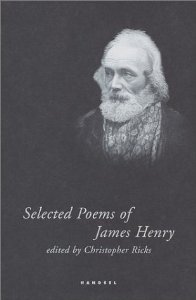 The Selected Poems of James Henry
The Selected Poems of James Henry
by James Henry
Handsel Books, 2002
180 pages / $22.00 buy from Amazon
1. There really is no direct route to Irish poet James Henry (1798- 1876).
2. Most often his fans come by way of Henry James (an absent comma in a library computer) and a well-developed sense of humor.
3. Despite a consistent output (six strong books of poems, beginning in the 1850’s), James Henry was a virtual unknown until the poet Christopher Ricks included him in the 1987 New Oxford Book of Victorian Verse.
4. According to Ricks, the books he found in the Cambridge Library had never been cut. Ricks discovered an enormous treasure in Henry’s work.
5. James Henry shows a hilarious and distinctly modern vision of the world.
6. He champions the prosaic.
7. In one poem he declares, “Blessed be the man who first invented chairs!/ And doubly blessed, the man who beds invented!”
8. In another he celebrates the pleasure of the mattress, “Let those, who will, enjoy the English bed/Of feather-stalks from which successive housemaids/Have pillaged to the last flock of the fine down/…Give me the Italian mattress broad and long/ Of fine, combed wool elastic; and the coarse/Hempen or linen sheets, washed in the fountain.”
9. On his favorite blossoms, “Sweet breathes the hawthorn in the early spring/ And wallflowers petals precious fragrance fling,/Sweet in July blows full the cabbage rose/ And in rich beds the gay carnation glows…But of all odorous sweets I crown thee queen/ Plain, rustic, unpretending, black eyed bean.”
10. Henry was a practicing physician and a student of Virgil. Following his retirement, he traveled Europe, settling in Dresden. This modern cosmopolitanism and his career in medicine both shine through in his strongest works.
11. His “Dialogue between a stethoscope and an unborn child” is at once hilarious and deeply unsettling. The unborn debates the merits of coming into the world if he will only have to leave it again someday. And expresses skepticism towards the notion of soul.
12. From Freud, “One feels inclined to say that the intention that man should be “happy” is not included in the plan of “Creation.”
13. Henry’s take on “Creation” echoes this skepticism, “On the day before the first day/ God was tired with doing nothing/ And determined to rise early/ On the next day and do something.”
14. In “The Lord and Adam, In the Garden of Eden,” the pair discuss tropes and the dangers of being overly literal, “THE LORD: Literal again! It would have saved some trouble/ To have put a few grains more of poetry/ Into the dull prose of thy composition.
15. Such dialogues will elicit comparisons with the Irish high modernists: Joyce, Beckett, O’Brien. They similarly evoke Kenneth Koch and “Popeye Alone.”
16. It seems Henry presents a sort of early modernism.
17. Of his travels, “Long weeks the rain had lasted and but ceased/ Early that morning, yet beneath our feet/ Firm and scarce damp the well-made road of gneiss/With white quartz grains and glassy hornblende sparkling/And smooth as mansion avenue newly rolled./Leaden the sky and lowering, the whole earth/ Green and luxuriant with the fresh spring season/ And long rains—ah, that the too liberal moisture/ wash not the pollen from the drooping halm/And disappoint the sickle in July!…We leave the too straight highway and along/The hillside wind by Oberweir and Sulzbach/ Treading at every step on linden blossoms/ And scarce-formed pears down beaten to the ground/ By the preceding nights unpitying rain/ And, had the evening not been damp and misty/ Had seen from our advantage-ground away/ Beyond the Hardtwald and Rhine panorama/ To the Vosges plateaus and the setting sun…”
18. One of the strongest poems of the collection comes in a simple anecdote.
19. “I Saw, in Dresden, on a windy day/ A man and woman walking side by side/– I tell a plain fact, not a poet’s story/ And to my reader’s judgment leave the moral–/ He on his arm was carrying his great coat/ She upon hers, a heavy-laden basket/ When lo! A blast of wind comes, and the man/ Attempting to put on his coat, lets fall/ Out of his mouth, ah, misery! His cigar/ But the compassionate woman quickly sets/ Her basket on the ground, and with her right hand/ Helping the coat on, with the left picks up/ And puts into her own mouth, the cigar/ And whiffs, and keeps it lighting, till the man’s/ Ready and buttoned up, then gives it back/ And takes her basket, and, all right once more/ Away they go, the man with his cigar/ The woman with the man, well pleased and happy.”
20. Freud apocrypha informs, “Sometimes a cigar is just a cigar.”
21. And Groucho apocrypha further develops, “Lady, I love my cigar but I take it out of my mouth sometimes.
22. So, it’s pretty well established that something is going on here.
23. Henry (a perfect example of Freud’s cosmopolitan) puts down simple observations that say a lot about the mounting anxieties of modernity.
24. His best poems anticipate the urban documentaries of Charles Reznikoff and the later Ashcan school.
25. Charles Ricks has made an enormous discovery.
Tags: 25 Points, Handsel Books, James Henry, The Selected Poems of James Henry

Reading this now. This book is great — way funnier than I would have expected.